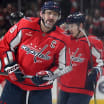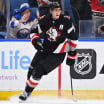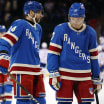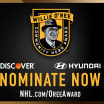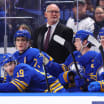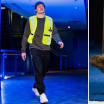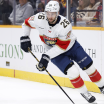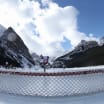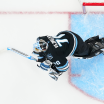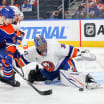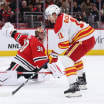NHL.com's Q&A feature called "Five Questions With …" runs every Tuesday. We talk to key figures in the game and ask them questions to gain insight into their lives, careers and the latest news.
The latest edition features Dean Evason, coach of the Minnesota Wild.
Five Questions with Dean Evason
Wild coach talks about preparations for first NHL job, getting team into playoffs
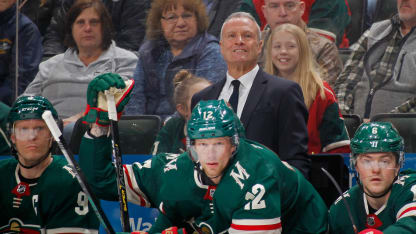
© Bruce Kluckhohn/Getty Images
By
Tim Campbell
NHL.com Staff Writer
Dean Evason has a lot on his plate.
The 55-year-old native of Flin Flon, Manitoba, was named coach of the Minnesota Wild on Feb. 14, replacing Bruce Boudreau, who was fired. Evason, who was an assistant under Boudreau, is tasked with getting the Wild (29-25-7) moving toward a spot in the Stanley Cup Playoffs.
"Our biggest thing is just the pace of our game," Evason said. "We want our guys to play the game with a high pace. That means not only getting up the ice offensively with pace and getting to the net, but it means defensively as well -- closing, stick on puck, stops and starts and playing with energy in all three zones. That's the biggest message likely that we've tried to convey."
Minnesota is sixth in the Central Division, 13 points behind the third-place Dallas Stars, after a 4-1 loss to the St. Louis Blues on Sunday. The Wild are also five points behind the Arizona Coyotes for the second wild card into the playoffs from the Western Conference.
Evason has preached focus as the playoff race has intensified and the 2020 NHL Trade Deadline, which was Monday, approached.
"I've honestly never looked past today," he said. "I joke that my mother told me a long time ago, 'One day at a time,' and we don't look past today or our preparation today. That's it. I can't control the deadline and what anybody else does. We try to control, as a coaching staff, our practice plan and our video preparation and hopefully the players can do the same thing."
Evason is in charge for the first time in the NHL, but he has a wealth of coaching and playing experience that has prepared him for this opportunity. He was named an assistant with the Wild before the start of the 2018-19 season. Prior to that, he coached Milwaukee (American Hockey League) for six seasons. He was an assistant with the Washington Capitals from 2005-12, working with Boudreau there from 2007-12.
As a player, Evason had a reputation as a solid two-way center. He had 372 points (139 goals, 233 assists) in 803 NHL regular-season games for the Hartford Whalers, Washington Capitals, Dallas Stars, San Jose Sharks and Calgary Flames from 1983-96.
Here are Five Questions with … Dean Evason.
In your career as a player and a coach, you have paid your dues. How important do you consider that to be today?
"I don't know the right word for it, but it's all about learning from your experiences. If that's paying your dues, then that's what a lot of coaches do. You learn from every situation. As a player, there are many things I learned that I can apply as a coach; obviously being an assistant coach and a head coach in many situations, I've had a lot of really great learning opportunities. If I could take a few of them -- you might not use them all -- and apply them to what we're trying to do right now and today, it will give us a chance to have success."
As an NHL player, you played for some renowned coaches, including Jack Evans, Rick Ley, George Kingston, Bob Gainey and Pierre Page. What things stand out for you from those playing days?
"There's a perfect example. I can go from Tex Evans (in Hartford), where we really didn't have a system, just go. He just wanted us to compete and play hard and battle and get in on the forecheck. But it wasn't like it is nowadays, where you're playing a 2-1-2 or a left-wing lock or a trap. It was just 'go.' Then I played (on Canada's national team in 1996-97) for coach Andy Murray, who was extremely structured and systematic, playing really tight. I think you take pieces of both, and I could go on about Bob Gainey to Bill LaForge (Evason's junior coach in Kamloops of the Western Hockey League from 1982-84), everyone that I've been able to be around. You need to draw on all those experiences and pick which ones you like and throw out the ones you don't."
What other influences on your coaching do you carry forward from the wealth of your experience?
"Bob Gainey, obviously, and Andy Murray and Bill LaForge, those would be the three coaches that really, from when I played, instilled a lot of stuff in me as a person and as a player. And now some of those things translate to some of the things I like as a coach. Those are the three that stick out."
Your first professional job as coach was with Milwaukee. How important was that in developing your coaching abilities?
"Huge. I was fortunate to be a head coach (with Kamloops) in the Western Hockey League too, and then go to the NHL as an assistant to work with men, then having the opportunity to run the program in Milwaukee. It all wasn't quite at this level, but those were stepping stones and it's a process that you go through. I liken it to a playing career. I played in the American Hockey League for a year and a half, and that was a step in order to get to the NHL. The same thing happened in coaching. You have to stay patient and do what you need to do on a daily basis in order to set yourself up. I've been fortunate that I'm in this situation now."
You were a gifted offensive player as a junior, getting 164 points in one of your WHL seasons. As an NHL player, your game was decidedly more two-way. How did you discover the value of other parts of the game?
"I think it was one of the things I use now -- being accountable. I understood I was accountable to myself and honest to myself and said that I am not going to be able to be in Wayne Gretzky's league. But I played against Wayne Gretzky, and I knew that the one thing I could try to do was to compete as hard as he did when I played against him and on a nightly basis. That was always my goal, to try to outcompete and outbattle whoever I was against. And I've been fortunate to have played against some amazing hockey players. Two of the most amazing ones were Gretzky and Mario Lemieux, and I was able to be in a faceoff circle against them. But I knew I didn't have more skill [than they did], and I was going to have to find a different way to survive. My way to survive was to concentrate and really try to hone my defensive skills where I could play against people like that. After that, it was just to keep competing and battling every night."

